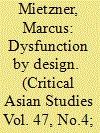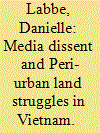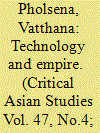|
|
|
Sort Order |
|
|
|
Items / Page
|
|
|
|
|
|
|
| Srl | Item |
| 1 |
ID:
141903


|
|
|
|
|
| Summary/Abstract |
In 1966 the UN passed two International Human Rights Covenants that are among the great achievements of humankind. The covenants were adopted in five equally binding languages, one of which was Chinese. The People's Republic of China (PRC) is generally assumed to have ratified one and signed (but not ratified) the other. In 1973, however, soon after the PRC began representing China in the UN, new Chinese-language versions of each mysteriously came into existence. These are the versions one is likely to find on the UN website, and they are what the Chinese government treats as the “covenants.” The authors of this article show that these contain substantial revisions from the covenants that had been passed by the UN 1966 and subsequently ratified by at least 164 countries. The revised versions are so different, in fact, that one could well question whether the PRC actually embraced either covenant. The covenants granted rights that the revisions would later withdraw, and in at least one case the revisions recognize a right that is absent in the covenants. Based on their comparative analysis of the various versions, the question arises as to whether China is a responsible actor in the international legal order and a reliable partner when it comes to entering into agreements with other countries or acceding to international treaties. Given that China comprises over one-fifth of humanity, it also brings into question whether the principles in the covenants can claim absolute validity and anything like universal acceptance.
|
|
|
|
|
|
|
|
|
|
|
|
|
|
|
|
| 2 |
ID:
141907


|
|
|
|
|
| Summary/Abstract |
Despite an ever-increasing number of arrests of elite politicians by Indonesia's anticorruption commission, the country's levels of political corruption remain stubbornly high. This article argues that the main reason for this apparent paradox is Indonesia's dysfunctional party and campaign financing system. None of the three elements upon which this system was built (membership dues, donations, and state subsidies) has worked to finance politics in an effective manner. This systemic failure is far from accidental: it is caused and perpetuated by an elite that prefers illicit fund-raising to the limitations that a more orderly funding mechanism would impose. As a result, political corruption continues unabated, oligarchs have penetrated party politics, and state budgets are misappropriated for political purposes. Indonesia's new president, Joko Widodo, has promised to reform the political finance regime, but the power of deeply entrenched interests groups means that any change will be painfully slow.
|
|
|
|
|
|
|
|
|
|
|
|
|
|
|
|
| 3 |
ID:
141906


|
|
|
|
|
| Summary/Abstract |
This article compares the financing of political parties and candidates in two Southeast Asian countries. In Malaysia, some political finance regulations exist only on paper, and political financing is for the most part not restrained at all. In contrast, the financing of candidates and parties has always been tightly circumscribed in Singapore. These different strategies, “laissez-faire” versus “strict control,” are the consequence of various factors. In Malaysia, the New Economic Policy has effected a close, often economically unproductive linkage between the state, the ruling Barisan Nasional coalition, and business. The rise of businesspeople has resulted in the commercialization of competition within (the United Malays National Organisation. Additionally, increasing competition between the ruling coalition and the opposition has resulted in growing expenditures for electioneering in the form of advertisements and electoral patronage. The laissez-faire style of regulation has been compounded by the difficult-to-control practices in East Malaysia (Sabah and Sarawak), where vote buying, electoral patronage based on the largesse of oligarchs, and obvious nonobservance of the rules have been typical. In contrast to Malaysia as a whole, the costs for parties and candidates are still relatively low in Singapore. As a cadre party, the PAP (People's Action Party) is relatively autonomous from private business interests, and intraparty competition is not commercialized; the developmentalist state is highly productive, and the ties between the state, the PAP, and business are not characterized by cronyism. Moreover, electioneering is not very commercialized because the opposition is still relatively weak.
|
|
|
|
|
|
|
|
|
|
|
|
|
|
|
|
| 4 |
ID:
141902


|
|
|
|
|
| Summary/Abstract |
This article explores the role of media-led dissent in Vietnam's contemporary land struggles. The analysis focuses on Vietnamese-language material published online by domestic and foreign media about the so-called Văn Giang incident – a high-profile land dispute that shook the country between 2009 and 2012. Looking at how the media treated this incident broadens studies of land struggles in Vietnam, which up till now have focused on peasants’ resistance strategies. This case not only shows that media practitioners engage in dissent with regard to land politics, but also that they engage in more straightforward criticism of the state and its corporate redevelopment partners than what most analyses of rural land struggles in Vietnam, centered on the micro-level and on “lawful” (O'Brien) forms of resistance, would lead one to believe. Illustrating this point, the author shows that media dissent throughout the Văn Giang land dispute openly challenged the government's justificatory discourse about “displacement for development” as well as the mismanagement of land resources on which political and economic elites rely to dispossess peasants from peri-urban lands. If it has not yet provoked major institutional changes, the media's contribution to land struggles has nevertheless succeeded in creating a genuine, national public debate on land politics in rapidly urbanizing Vietnam.
|
|
|
|
|
|
|
|
|
|
|
|
|
|
|
|
| 5 |
ID:
141905


|
|
|
|
|
| Summary/Abstract |
The three articles in this themed collection investigate the interplay between political finance regimes and the quality of democracy in Southeast Asia. Andreas Ufen's piece on political finance in Malaysia and Singapore argues that the semi-authoritarian regimes in both states have blocked the reform of campaign and party funding regulations in order to keep their opposition in check. The article on Indonesia, authored by Marcus Mietzner, showcases the country's dysfunctional political finance system as a major hurdle toward further democratization. In their contribution on Thailand, Napisa Waitoolkiat and Paul Chambers show that weak political finance regulations have contributed significantly to the shallowness of Thai parties. Overall, the collection demonstrates that without meaningful political finance reforms, Southeast Asia's democratic stagnation is likely to persist for many years to come.
|
|
|
|
|
|
|
|
|
|
|
|
|
|
|
|
| 6 |
ID:
141908


|
|
|
|
|
| Summary/Abstract |
This study examines the evolution of political party finance in Thailand, which has been crucial for party development. The nature of party finance cannot be examined separately from the country's democratization given that the military early on dominated political parties. At the same time, such financing traditionally depended upon either regional factions (for larger parties) or party leaders (for micro-parties), while state funding for parties was nonexistent. The 1998 and 2007 Organic Acts on Political Parties contained finance reforms to strengthen parties, making them more transparent and accountable. Yet these reforms have only been partly successful. Today party leaders, faction leaders, and the military continue to influence party finance. This study addresses the issue of party finance in Thailand by scrutinizing its historical evolution from the dawn of Thai parties and party laws in the 1950s to the present. The authors conclude, first, that the limited nature of party finance laws in the pre-1998 period legitimized military-backed parties while facilitating intra-party factionalism. Second, they contend that despite reforms in party finance laws in Thailand major flaws remain to be corrected.
|
|
|
|
|
|
|
|
|
|
|
|
|
|
|
|
| 7 |
ID:
141901


|
|
|
|
|
| Summary/Abstract |
Recent feminist debate about how to achieve the substantive representation of women in government has been conducted largely in relation to national parliaments in democratic states. This article brings a new perspective by examining grassroots rural government in contemporary China – an authoritarian state, which, however, began implementing village “self-government,” including elections, in 1987. The article draws on qualitative fieldwork in the Chinese provinces of Zhejiang and Yunnan. The authors went into this fieldwork with an understanding that women's substantive representation, democracy, and gender equality are mutually constituted and with an expectation that village self-government might make a much-needed contribution to the achievement of all three. However, we ran into trouble with this analytical framework. First, there were marked variations in villagers’ practices and understandings of “representation.” Second, we found that democracy was not a prerequisite for substantive representation. Third, most villagers we talked with claimed that “men and women are equal” and there was little conception of villagers’ interests diverging by gender. This article explores our analytical “trouble,” with a view to advancing scholarship on constraints to democracy in authoritarian states and suggesting fruitful directions for feminist theorists interested in the relationship between gender, representation and democracy.
|
|
|
|
|
|
|
|
|
|
|
|
|
|
|
|
| 8 |
ID:
141904


|
|
|
|
|
| Summary/Abstract |
The Tonkin–Yunnan railway constituted a significant piece of transport infrastructure of the French colonial empire in Asia. The 848-kilometer railroad was a technical achievement that took ten years to complete (1900–1910) at the cost of thousands of lives. Albert Marie, a young French engineer, worked on the construction of the Chinese section of the railway over a three-year period, from August 1904 to May 1907. Through the letters he sent to his family and the photographs he took during his assignment, vignettes of everyday life in the expatriate community and the local population, as well as of the daunting work on the construction sites in a hostile physical environment, are narrated in a very candid manner. The hardworking, ambitious, and (at times) bewildered engineer, like many of his contemporary fellow countrymen, was hopeful about French rule in parts of mainland Southeast Asia and southwestern China in the early twentieth century. Technology, in particular, was believed to be the instrument of civilization and modernity that would drive France's imperial expansion in the region and elsewhere; in 1907, Albert Marie left Yunnan to work on another daunting colonial railroad project, the Constantinople–Baghdad line.
|
|
|
|
|
|
|
|
|
|
|
|
|
|
|
|
|
|
|
|
|